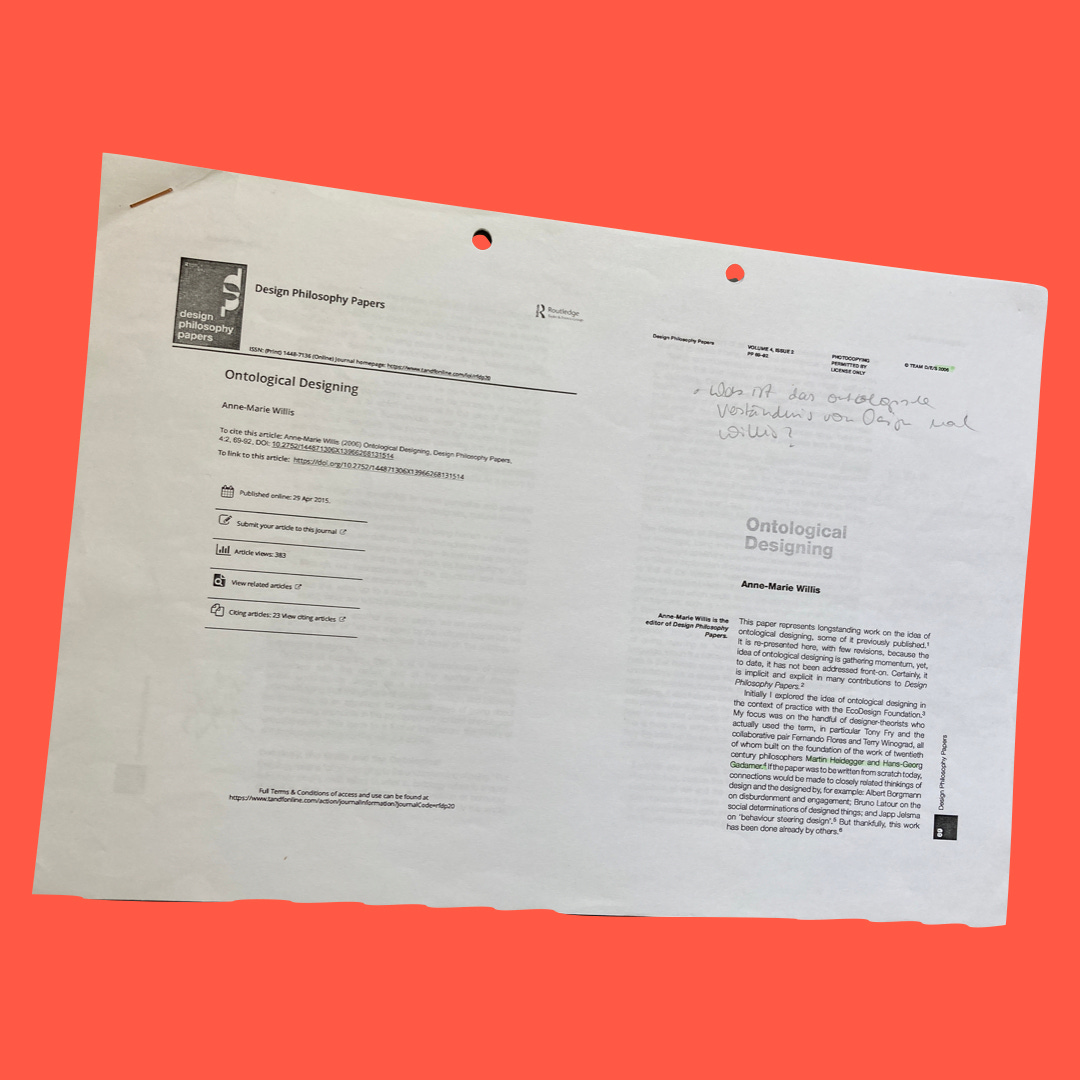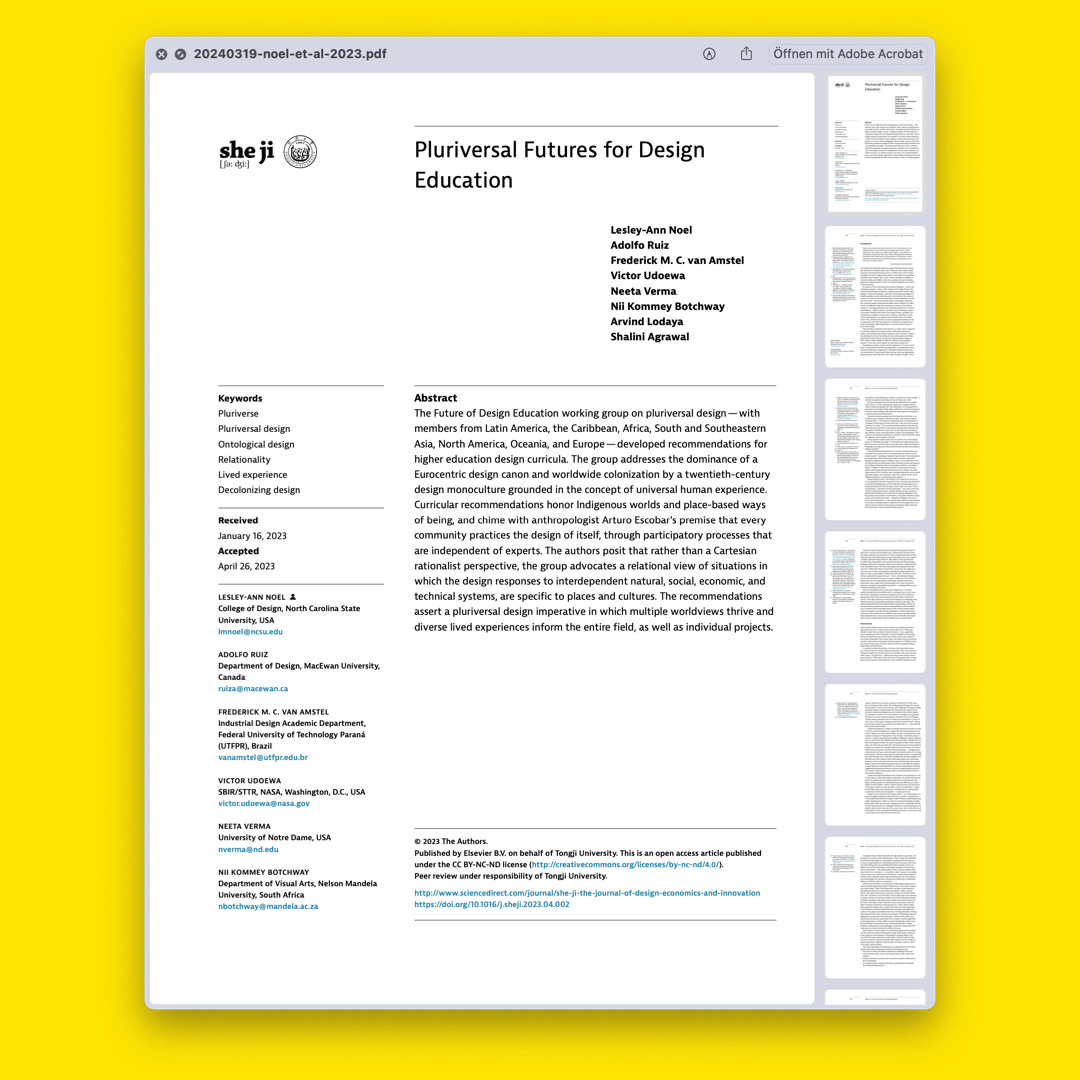Teaching Design – Infrequent Newsletter #7
Pluriversal Futures and Ontological Designing
Dear design teachers/learners and bibliography-lovers,
thank you for subscribing to this mailing list and supporting the research project! For those of you who have recently joined with a paid subscription a super big thank you, your support makes me feel really appreciated in my work. 💜
For the past months I have been working on a research project analyzing central motives in power critical discourses in and about design education. Two recurring and interrelated themes I have found are the concepts of Pluriversal Futures and Ontological Designing. So in this 7th edition of the newsletter I will be sharing a selection of texts that (1) offer an introduction to these concepts (2) propose pluriversality as basis for (more just) design education futures and (3) reflect critically on the concept of Ontological Design and its implications for design practice and theory.
Warm wishes and until next time,
Lisa
Added to the bibliography
Escobar, Arturo (2018): Designs for the Pluriverse. Radical Interdependence, Autonomy, and the Making of Worlds. Duke University Press, London: Durham.
»Design has doubtlessly been a central political technology of modernity. Regardless of where one situates the origin of design — whether with the first use of tools by early humans, the budding technological imagination of the Renaissance, the Industrial Revolution, or nineteenth-century modernism — the fact remains that as an aspect of everyday life design takes off with modernity.«
Original contribution and quote selection by Maya Ober.
Willis, Anne-Marie (2006): Ontological Designing. In: The Design Philosophy Papers, Volume 4, Issue 2, p. 69–92.
»Ontological designing implies a radically different understanding of design as practice and object than those generally available; it also implies different ways of understanding how we as modern subjects ›are‹ and how we come to be who/what we are in the modern world.« (p. 70)
→ Download the paper here.
Anastassakis, Zoy (2021): Redesigning design in the pluriverse – Speculative Fabulations from a School in the Borderlands. In: Mareis, Claudia und Paim, Nina (eds.): Design struggles – Intersecting histories pedagogies and perspectives. Amsterdam: Valiz, p. 169–186.
»One should not expect to find here a report of successes or results. First and foremost, this paper is an effort to think through attempts and rehearsals on ›education as a practice of freedom.‹ Nor will my attention be restricted to a distinct group of specific people. What interests me is the quality of affects and relations in play in the situations described. Later, in dialogue with the anthropologists Arturo Escobar and Tim Ingold, I will characterize this as ›pluriversal agencings.‹« (p. 169)
→ You can download the publication here.
Noel, Lesley-Ann; Ruiz, Adolfo; van Amstel, Frederick M.C.; Udoewa, Victor; Botchway, Nii Kommey; Lodaya, Arvind and Agrawal, Shalini (2023): Pluriversal Futures for Design Education. In: She Ji – The Journal of Design, Economics, and Innovation, Volume 9, Issue 2, p. 179–196.
»A pluriversal approach to design and design education sets aside the narrative of Eurocentric modernism for a range of locally rooted perspectives and a more complex view of the field of design. It reveals overarching values and purposes of design for bringing about ways of being — individual, group, or cultural — despite contradictions and conflicts in different contexts and narratives at a microscale. The multiplicity and intersectionality of perspectives in a pluriversal approach balance the power inequalities between ›those with privilege‹ and ›those who are oppressed.‹« (p. 183)
→ Access the paper here.
Baumgarten, Lisa (2023): Resonance and Ontological Design – On facilitating and obstructing transformative teaching and learning experiences in design education. In: Mehl, Johanna, Höfler, Carolin (eds.): Attending [to] Futures – Matters of Politics in Design Education, Research, Practice. Hamburg: Adocs Verlag, p. 51–57.
»As Escobar shows, we can only care for the world if we can relate to the world. In order to relate to the world, however, we need to feel like the world concerns us, as Rosa points out. It takes encounter and experience, being in touch with oneself, each other and the world. In short, it requires resonance— to feel empowered, to feel agency for transformative (design) practices. Foregrounding relationality and resonance in design education could be helpful in making sense, articulating, and countering those legacies. Design education has the potential to elevate design’s world-building capacities and by that open up a space to envision an alternative way of doing design in a careful way.« (p. 57)
→ You can download the paper here.
St John, Nicola; Rezende, Livia L.; Suhendra, Fanny; Gonzalez, Diana A. and Ahmed, Zenobia (2023) Interalities: a conversation on positionalities, localities, pluralities within design education futures. In: Jones, Derek; Borekci, Naz; Clemente, Violeta; Corazzo, James; Lotz, Nicole, Nielsen, Liv Merete und Noel, Lesley-Ann (eds.): The 7th International Conference for Design Education Researchers, 29.11.–1.12.2023.
»Our collaboration began with each of us sharing our own positionalities, and how our personal experiences, values, and motivations led us to engage in these inter spaces between decolonial, intersectional, and pluriversal design. Currently, there are dialogues emerging within design that recognise the importance of critical self-reflection, particularly in relation to power relations, voice, and representation, particularly within co-design and design history […]. Yet there is little design literature which speaks to the importance and value of acknowledging positionality for design educators, particularly within higher education contexts […]. We are left questioning what is the role of design educators in acknowledging their biases, identities and knowledges while engaging students to develop their own design practices? Here, we seek to reflect on our own values, attitudes, motivations and experiences that inform us as educators. Speaking to our own positionalities was the initial prompt from where our conversation began.« (p. 2)
→ Access the paper here.
Büsse, Michaela (2022): What are the politics of ontological design? A critical reflection in the mutual becoming of »the human« and »the world«. In: Mareis, Claudia; Greiner-Petter, Moritz and Renner, Michael (eds.): Critical by Design? Genealogies, Practices, Positions. Bielefeld: Transcript, p. 80–92.
»At least since the third Istanbul Design Biennial in 2016 the impact that design objects have on the self conception of humans has moved into the focus of theoretical investigations within the disciplines of design and beyond. By stating that ›Design is what makes the human‹ (Colomina / Wigley 2016:12), curators Beatriz Colomina and Mark Wigley popularized an investigation into the nature of design which they no longer conceive as serving human needs; instead, they think of design as a practice that cannot be disentangled from what «we» understand as ›the human‹. Centuries of designing not only brought forward objects but these objects, in turn, also affected the development of the human. Their approach can be seen in continuation with a constant broadening of the concept of design taking place since the second half of the last century, – from the crafting of an object, to the design of processes, systems and alternative futures, to the agency of the designed (see Krippendorff 2005). To the same effect that design gains more and more scope, it is assumed that , by means of design, ›existing situations‹ can be turned into ›preferred ones‹ (Simon 1996: 111 ) – a more comfortable chair, a more inclusive education system, a new human. However, what is preferred and by whom is usually assessed by the designer(s), thus carrying an implicit political statement which only becomes reinforced through the design output and thus should be treated with caution.«
→ Access the publication here.
ongoing Open Call
We invite contributions from you; design educators, students, alumni, researchers, pedagoges, enthusiasts and others to submit and share the sources which are reference points and/or inspiration to your practice! Your contribution will be published in our infrequent newsletter and in our text-based bibliography.
→ Find out how to contribute here.
Info
Teaching Design started as a collectively gathered bibliography focusing on design education from intersectional feminist and decolonial perspectives. Since its launch in September 2019, it has expanded into conversational formats, workshops, a temporary library and a space for reflections, which all has led to the platform in its current form.
→ Learn more about the research project here.
Currently the bibliography as well as this newsletter is curated and edited by Lisa Baumgarten unless mentioned otherwise.









